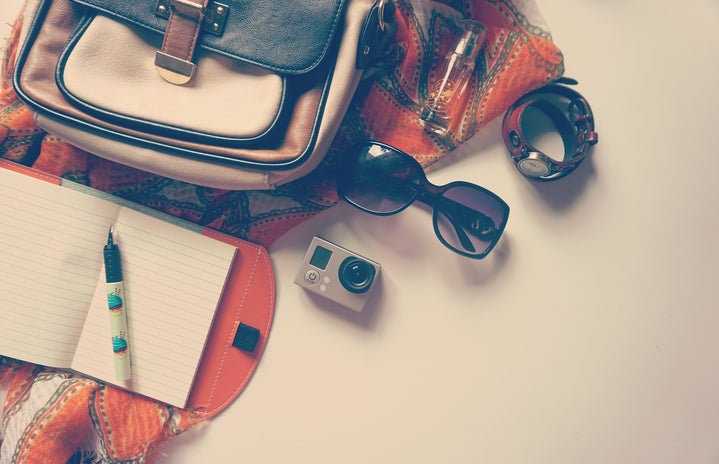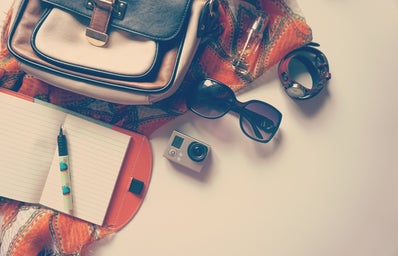If you’re new on campus at SMU then there’s probably one major thing that was incredibly shocking when you first started roaming around campus. You’d probably expect me to say the heat or something about the distance you have to walk to classes or maybe even the absurdity of “boulevarding,” but you’d be wrong, the most eye opening, intimidating factor of first walking around campus is being visually overwhelmed with the number of designer items being showcased from class to class.
Walking down the boulevard on a Monday morning you’ll see anything from Louis Vuitton tote bags, to Gucci sneakers. And this is just school wear folks, night wear is a completely different story. At night time Chanel and Versace make coveted appearances that cost their owners upwards of $7,000.
Which brings me to the question that hopefully drew you to this article in the first place: Is designer worth it? More importantly, why do we think it is? What cultural phenomenon has occurred to make us aspire to own bags and shoes that cost the equivalent of some apartment rents? In simpler terms, are designer items morally worth it?
I remember my first experience in a designer store. The smell of freshly pumped oxygen, the pristine shelves filled with different types of leather goods. It’s a bit like being a kid in a candy store, only this candy is worth thousands of dollars. It was a Coach store, which sadly, some would argue isn’t really designer. However, I was eight and my mom was buying me a wallet for my birthday. I didn’t know, and I still don’t know, why I needed a wallet at eight, but I suppose I did. And I remember, for the first time, while I was in that store ogling the artful displays, I wanted to buy things. There’s this overwhelming feeling of need that rears its ugly head upon walking into a designer goods store. The stores themselves are laid out pristinely, almost like a promise to make you too pristine and beautiful. Which is the crux of the beginning stages of buying designer, this false promise of beauty and security. When we are young we have no idea what the difference is between Macy’s and Dior, however, visually we can see a “difference.” We are inundated with crisp advertisements for Dior in magazines like Vogue but we see coupons for Macy’s in the newspaper. There’s an unspoken hierarchy that is established strictly through ads and visuals, and we subconsciously take this information and suddenly it begins to inform our decisions on our wants and desires.
So from the time of youth we have already reached a strange understanding about which brands are superior due to advertising and visual aesthetic. Now let’s observe the real culprit for our obsessive spending, social hierarchy.
Hierarchies and cliques, the very words that seem to monopolize our social lives, and make our skin crawl at the same time. The idea of: what’s cool? What’s in? Those are the thoughts that reign supreme. This past weekend was my twenty-first birthday, and my boyfriend and I went out to a couple bars and clubs. At one particularly popular club we waited in line for about an hour, and a young woman, about my age, got out of her Uber with her friends and my boyfriend remarked, “See, she’s dressed like she knows people, or at least the people who can get her in.” Upon this statement I regarded her further, she wore a high waisted black skirt adorned with a Gucci belt and heels, her crop top was lined with what could have only been diamonds, and over her shoulder was a white Chanel cross body bag that cost upwards of five thousand dollars. She was cute, not gorgeous by any standards, but her ensemble elevated her in some strange sense to this elite class dominated by young twenty-somethings who don’t particularly do anything but spend money. And he was right, she did get in, skipped the line entirely, and I was left outside in my significantly lesser clothes, primarily from H&M and Forever 21, wondering why I left my Louis Vuitton at home.
Alright, you caught me, I admit, I do own some designer products. I have a Louis Vuitton that I got when I visited Paris, and a Chanel scarf from the same trip. I’ve accumulated two pairs of designer shoes from my first trip to New York and a pair of sunglasses from my first trip to Los Angeles. But that’s the thing right, I never bought something because I thought it would add to the perception of my character, I bought those items because I valued the experience, and I valued the product. Despite the popular belief that I’m sure has accumulated up to this point of the article, I love fashion. I think fashion is an incredible outlet for creativity and self-expression. That’s what the issue is, lack of self-expression. We have to look at what we are purchasing and ask ourselves, “Am I buying this to enhance my own personal style, or am I buying this to conform to the style society says I should have?”
I’ve always heard the saying, “Don’t let the dress wear you,” and that couldn’t be more true. We’ve fallen into a trap as society to follow rather than lead, and this is reflected in the consumption of designer goods. Social media is inundated with images of celebrities showered in designer goods, and we as a society eager to mimic what gets the most likes, promptly attempt to duplicate the look. And that’s the real issue, isn’t it? Living in a world regulated and ruled by conformity. Remember those girls who got into that club I was talking about? Well I’m sure if you stripped them down to no make-up and a pair of sweatpants and a t-shirt we’d be very similar. Just a girl in college who has goals and aspirations like us all. But instead of seeing that girl, we see brands and labels that signify a completely different type of person entirely.
So, are designer goods “bad”? I would have to say, like most things, in moderation, not at all. Is there anything wrong with having a designer purse? No. Is there anything wrong with having a pair of designer shoes? No. Unless, you either A: think they’re a commodity and have no idea of the value of what you’re buying, or B: are doing so in attempt to adhere to a social construct. Designer is completely acceptable until you start using it as crutch for your personality. Clothing, shoes, accessories, they are meant to culturally and personally make a statement about ourselves, not celebrity influencers.
My advice to you, whomever you may be, if you want a designer bag, save up for it, learn to respect the monetary value of your purchase. And if you do want to be decked out in designer, make sure you aren’t doing so to hide yourself in an idea, but rather to express yourself in spite of that idea. Designer brands are only of worth if you understand your own self-worth. And like Tyler Durden said in “Fight Club” if you’re not careful, “The things you own end up owning you.”



